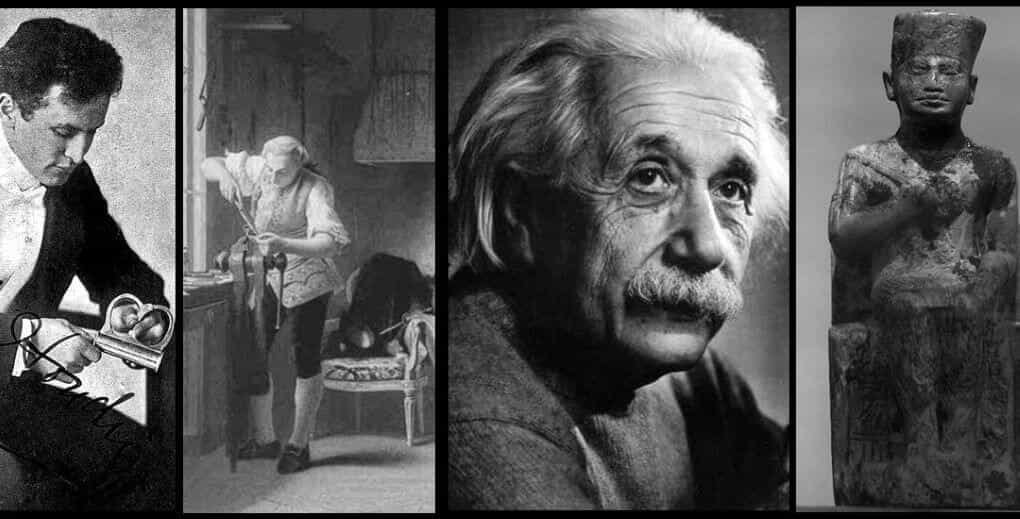Famous Men Who Were Also Locksmiths: Unlocking History’s Hidden Passions
The world of locksmithing is often shrouded in mystery. While we rely on their expertise to secure our homes and valuables, the locksmith themselves remains a relatively unknown figure. But what if I told you that some of history’s most influential figures harbored a hidden passion for the art of the lock?
This article delves into the surprising pasts of four iconic individuals, revealing their lesser-known connection to locksmithing: Harry Houdini, King Louis XVI, Albert Einstein, and Pharaoh Khafra.
Harry Houdini: The Master of Escape, Acolyte of the Lock
The name Houdini is synonymous with escape artistry. He captivated audiences with his daring stunts, wriggling free from seemingly inescapable constraints. But Houdini’s success wasn’t just about magic; it was about a deep understanding of locks.
Houdini honed his skills as a young man, mastering the art of lock picking. This knowledge became the foundation for his escape illusions. He meticulously studied lock mechanisms, their vulnerabilities, and the precise techniques needed to bypass them. This expertise wasn’t just for showmanship; Houdini also used his skills to expose faulty locks, advocating for improved security measures.
Houdini’s legacy extends beyond the world of magic. He elevated the role of the locksmith, demonstrating the power of this specialized skill set. His contributions to both entertainment and security remain influential, highlighting the importance of understanding and mastering the tools of one’s trade.
King Louis XVI: A Monarch with a Mechanical Mind
King Louis XVI, the ill-fated monarch of France during the revolution, is remembered for his dramatic downfall. However, history often overlooks his more personal pursuits. Louis XVI, it turns out, was an enthusiastic amateur locksmith.
Behind the royal facade resided a man fascinated by the intricacies of mechanisms. He spent a significant amount of time tinkering with locks, taking them apart and understanding their inner workings. This passion wasn’t merely a hobby; it reflected a curious and inquisitive mind.
While Louis XVI’s reign ended tragically, his interest in locksmithing offers a glimpse into his personality. It portrays him not just as a king, but as an individual with a genuine interest in the world of mechanics and engineering. His meticulous attention to detail in lock design mirrored his approach to governance, albeit with far more successful results in the former than the latter.
Albert Einstein: A Mind for Physics, A Heart for Locks?
Albert Einstein, the revolutionary physicist who reshaped our understanding of the universe, had a surprising career aspiration – to be a locksmith. While most associate him with groundbreaking theories like relativity, Einstein himself admitted a fascination with the practical world of locks.
This isn’t to say Einstein regretted his scientific pursuits. However, his interest in locksmithing highlights his appreciation for ingenuity and problem-solving. Perhaps he saw a parallel between the elegant solutions of physics and the intricate mechanisms of a well-crafted lock.
Einstein’s connection to locksmithing, though unconventional, reminds us of the multifaceted nature of genius. Great minds are often drawn to explore various avenues, seeking beauty and intellectual challenges in unexpected places. His whimsical desire to become a locksmith underscores the notion that even the greatest scientific minds have a yearning for simplicity and hands-on problem-solving.
Pharaoh Khafra: The Father of Lockmaking
Traveling back millennia, we encounter Pharaoh Khafra, the ruler credited with constructing the Great Sphinx of Giza. But Khafra’s legacy extends beyond majestic monuments. He is also considered the father of lockmaking.
The ancient Egyptians were preoccupied with safeguarding their treasures, particularly in the afterlife. This led to the development of sophisticated locking mechanisms for tombs and pyramids. Khafra is believed to have played a pivotal role in this innovation.
The exact nature of these early locks remains shrouded in time. However, their existence highlights the ingenuity of the ancient Egyptians and their understanding of security measures. Khafra’s contribution marks the beginning of a long and fascinating history of lockmaking. His efforts to protect valuables in the afterlife demonstrate a profound understanding of the need for security, an understanding that laid the groundwork for future advancements in locksmithing.
The Evolution of Locksmithing
The art of locksmithing has evolved significantly from its early days in ancient Egypt to the present. While the basic principles of securing valuables have remained constant, the technology and methods have advanced dramatically. Today, locksmiths use sophisticated tools and techniques to provide security in an increasingly digital world.
Modern locksmiths continue to innovate, developing new locking mechanisms and security systems to combat ever-evolving threats. Their work is vital in maintaining the safety and peace of mind of individuals and communities. From biometric locks to smart security systems, the field of locksmithing is at the forefront of technological advancement, ensuring that security measures keep pace with modern needs.
Famous Modern-Day Locksmiths
While historical figures like Houdini, Louis XVI, Einstein, and Khafra provide a fascinating glimpse into the intersection of locksmithing with fame, there are also modern-day locksmiths who have made significant contributions to the field. These individuals may not be household names, but their innovations and expertise have shaped the locksmithing industry.
For instance, engineers and inventors in the locksmithing industry have developed groundbreaking technologies such as the Medeco high-security lock, which offers superior protection against picking and bumping. These modern locksmiths continue to push the boundaries of what is possible, ensuring that our homes and valuables are safeguarded against contemporary threats.
The Importance of Locksmithing in Modern Society
Locksmithing remains a crucial profession, ensuring the security of our homes, businesses, and personal belongings. The expertise of locksmiths provides a fundamental service that is often taken for granted but is essential for our daily lives. Without the skill and knowledge of locksmiths, the security and peace of mind we enjoy would be significantly compromised.
Modern locksmiths continue to innovate, developing new locking mechanisms and security systems to combat ever-evolving threats. Their work is vital in maintaining the safety and peace of mind of individuals and communities. From high-security locks to advanced electronic security systems, locksmiths play a critical role in protecting our assets and loved ones.
Conclusion: Celebrating the Unsung Heroes
Locksmithing is a profession that often goes unnoticed, yet it plays an essential role in our daily lives. The famous figures who engaged in locksmithing remind us that this craft has a rich and varied history. From ancient Egypt to modern times, locksmiths have been the guardians of security, constantly adapting to new challenges and technologies. As we move forward, it’s important to remember and celebrate these unsung heroes who ensure our safety and security.
These stories showcase the surprising link between renowned figures and the world of locksmithing. Houdini’s escapes, Louis XVI’s tinkering, Einstein’s hidden desire, and Khafra’s pioneering work – all demonstrate the multifaceted nature of these individuals and the significance of locksmithing throughout history. Whether it’s the intricate mechanics of a lock or the advanced technology of modern security systems, the art and science of locksmithing continue to be integral to our safety and peace of mind.

